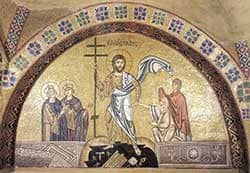 |
|
Harrowing of Hell, 11th c., via Wikimedia |
What is Easter?
Easter is a Christian celebration of the resurrection of Jesus. Traditionally, Easter is not just Resurrection Sunday, but an entire fifty-day season of celebration that extends until Pentecost Sunday.
Two thousand years ago, Jesus was a Jewish rabbi whose teachings and actions threatened the authority of the religious leadership. He had gained a significant following among the people, enough that some of the Jewish leaders conspired to put him to death. The Roman governor, Pontius Pilate, wanted to avoid a political crisis, so when a riot seemed to be brewing, he condemned Jesus to death.
The Roman mode of execution for non-Roman citizens was often crucifixion, a protracted form of torture where the victim is nailed to a cross until he dies. Jesus, along with two criminals, was crucified. After his death, he was wrapped in linens and buried in a tomb.
Christians believe that early Sunday morning, Jesus rose from the dead. His new life is a sign from God that Jesus has defeated death, and opened up a new way to God through faith in him.
The story of the crucifixion and resurrection is in all four Gospels: Matthew 26-28; Mark 14-16; Luke 22-24; John 18-21.
Where does the word "Easter" come from?
The word Easter has pagan roots. The word never appears in Scripture. Many Christian communities around the world call the holiday Pasch, which comes from the word Passover. Jesus was crucified on the Jewish Passover holiday. Some scholars think that, at some point in Western Christian history, the Church absorbed the word "Easter" from its pagan contexts, since the goddess Eostre was celebrated around the same time that Passover, and thus the Resurrection, was usually celebrated—on or near the spring equinox.
Why does Easter include symbols like dyed eggs and rabbits?
Just as the word Easter was taken from pagan contexts, so were other symbols of spring. Some German traditions of spring included a rabbit that would bring eggs dyed red. Eggs are frequently symbols of fertility, and thus associated with springtime and new life. These motifs have been absorbed into Western celebrations of the Easter season but have no intrinsic relationship with the Christian holiday.
Why is Easter so important to Christians?
The meaning of Easter is tied to the meaning of Christmas and the teaching of the Incarnation. Christianity has taught that Jesus was fully human and fully divine. His life, therefore, was more than the sum of his teachings and actions. He was more than a rabbi. Thus, when Jesus died on the cross and then was raised on Easter morning, a new way opened into relationship with God. In some way, though many explanations exist, Jesus' death atoned for human sin and brokenness; his resurrection gave hope that God has something more for humanity than suffering and death.
What kinds of traditions does Holy Week include?
Nearly all Christian communities celebrate Palm Sunday, the Sunday before Easter Sunday. On this day, scriptures tell of Jesus' triumphal entry into Jerusalem, a story told in all four gospels (Mt. 21:1-11; Mk. 11:1-11; Lk. 19:28-44; Jn. 12:12-19). This is the beginning of Holy Week, the most central time of Easter preparations.
The Thursday of Holy Week is called Holy Thursday or, sometimes, Maundy Thursday. Maundy comes from the Latin word mandatum, which means commandment. On Maundy Thursday, Christians remember Jesus' Last Supper with his disciples, at which he gave them his great commandment: "A new command I give you: Love one another. As I have loved you, so you must love one another" (Jn. 13:34). Many Christians remember Jesus' last meal by washing one another's feet, something Jesus did for the disciples (Jn. 13:1-17). After the footwashing, many churches strip the altar of candles, linens, and sacred vessels, and wash the altar. Some churches hold an all night prayer vigil from the time of the evening service until 9:00 the next morning, the time at which Christ was crucified.
The Friday of Holy Week is called Good Friday. Though it is the day of Christ's crucifixion and death, it is considered good because on that day God's love triumphed over the powers of sin and evil that had held the world in bondage. Christians honor this day with fasting and prayer. According to the gospel accounts, Jesus was crucified at 9:00 in the morning; from noon to 3:00 p.m., the sun eclipsed as Jesus suffered and then died. Many churches hold noontime services, and traditionally there is no Eucharist at that service. While crosses throughout the church building have been covered with purple cloth from the beginning of Lent, on Good Friday they are covered with black cloth.





